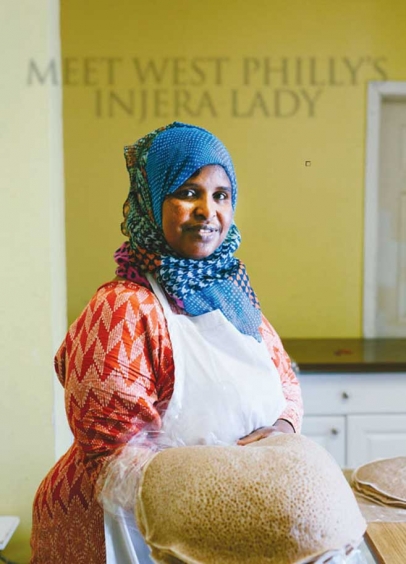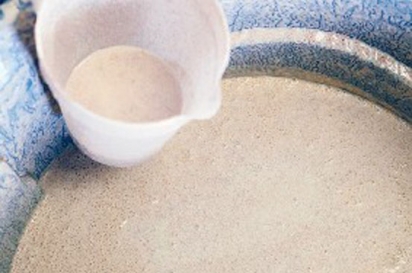MEET WEST PHILLY’S INJERA LADY
Just like she does every night, Jemila Mohamed is making injera, Ethiopia’s famous flatbread.
In the sweltering back room of a small restaurant on South 45th Street in West Philly’s Walnut Hill neighborhood, five propane burners glow blue under five hot mitad: round, flat pans as big as manhole covers with a wooden handle on each side. Mohamed scoops a measuring cup of thin, sand-colored batter from a pitcher and pours, hitting just above the center of the griddle. She gives the mitad a quick swirl, covering its surface in a perfectly even circle of batter and sets it back on the heat to cook.
Then it’s on to the next one, and the next, and the next, and the next. A minute or so later, the first injera gets covered to finish cooking before Mohamed slips a circular straw mat beneath the bread, whisking it off the heat and onto a table covered with stacks on stacks of identical pieces. Injera with even a hint of dark color on the bottom goes into a small pile of seconds that will be sold for less.
She’ll keep going until three or four in the morning, until orders for the next day—sometimes up to 2,000 flatbreads when she’s catering a wedding—are filled.
Mohamed has been making injera, the spongy, tender, fermented bread made from teff flour that’s served with stews and salads in Ethiopian and Eritrean cuisine, since 2014. But she first learned to make it when she was nine years old, living as a refugee in Ethiopia after fleeing the repressive government in her native Eritrea. The nation is sometimes known as “the North Korea of Africa” for its human-rights abuses, restrictions on freedom of movement and expression and forced military service that can extend from adulthood to retirement age.
“A lot of people make beautiful injera at home,” says Mohamed, who radiates calm even when she’s doing her quick but unhurried dance from grill to grill. “When they go into business, they cannot make it. I don’t know why.”
Mohamed’s recipe seems to be the exception. Her batter includes around 75 percent teff, more than most, to enhance the flavor, and she pours her injera a little bit thicker. Customers who have experienced heartburn or bloating after eating other injera, she says, don’t feel these effects with her recipe.
“Many people, they stop eating injera. Now they start eating injera—my injera,” she says, beaming. “They say it’s very good.”
By seven each morning, Mohamed has mixed water, teff flour, self-rising wheat flour, and her starter in a huge container the size of a garbage can. She checks on the mixture throughout the day, tweaking ingredients as needed to get the batter perfect. If the ambient temperature—a balmy 70 to 75 degrees Fahrenheit—keeps steady, it will be ready to cook in 12 to 18 hours; too much heat or cold will alter the results. “It’s like a baby,” Mohamed says. “You have to take care of injera. You cannot just mix it and go.”
By nine, when the restaurant out of which she works closes, the batter is ready: not too sweet, not too sour and bubbling with fermentation.
When you buy Mohamed’s injera at local shops, it’s a delicious product, always made the night before. But the bread fresh off the grill is a revelation: featherlight and less springy, with just a hint of crispness around the edge. The teff flavor is more apparent—earthy, nutty and tangy. By special order, she’ll also make a 100 percent teff injera, with a darker brown color and strong flavor, that’s also gluten free—a product that she says white American customers especially like.
After growing up in Ethiopia, Mohamed lived in Saudi Arabia for several years before coming to the United States to live with an uncle in North Philadelphia in 1999. She married an American man and had two children; then her husband convinced her to move south to Atlanta for better opportunities and schools. It was there that she first made injera professionally, hired just to cook the bread—not her own recipe—for another woman’s business.
But in Atlanta, Mohamed found herself escaping from another dangerous situation. Her husband became violent and abusive, and they separated in 2008.
“I have no good luck,” she says. “I have difficult everything, but I never give up. Never give up.”
A survivor to the core, Mohamed is grateful for the help she’s received in her life, and she strives to support others where she can. “I am very strong woman,” she says, her face serious. “I like to work hard. And I like to have my own, but I love to help people, and even though I don’t make much money in here, I help a lot of people. Even though I don’t have that much, I share with them.”
Mohamed returned to Philadelphia after splitting with her husband. When she couldn’t fi nd work, her uncle suggested trying out the injera business, this time with her own recipe. She passed out samples, and Makkah Market, a grocer specializing in Middle Eastern food and groceries in the neighborhood, became her fi rst wholesale customer—a perfect fi t for a neighborhood with a signifi cant East African population and the city’s largest mosque.
Another customer, the owner of Ethio Cafe on 45th Street, started buying the injera to serve alongside the Ethiopian menu; Mohamed moved production into the back of her restaurant. She also sells to two other stores—a grocer and a gas station— in southwest Philly, where a signifi cant population of East African immigrants has settled. Even before her success with injera, Mohamed loved cooking. Her aspiration was always to run her own restaurant.
“That was my biggest dream, to do breakfast, lunch and dinner and continue [doing] injera at nighttime.” When Ethio Cafe went up for sale, she jumped at the chance. In the summer of 2016, she opened Mubarak Shawarma, which offered the former tenant’s Ethiopian menu alongside pita sandwiches and platters of falafel, kibbe, and, of course, its namesake dish of grilled meats.
The prices were good, the portions huge and the food delicious— but Mohamed couldn’t fi nd good staff to work at the restaurant. She found herself running the kitchen during the day and making injera at night, sleeping only a few hours at her home on 46th Street before coming back in to start morning service. With two schoolaged children to care for, something had to give. She decided to give up the restaurant at the end of 2016, turning it back over to the previous owner.
For now, Mohamed wants to focus on growing her injera business, especially reaching injera-loving communities—in addition to Ethiopians and Eritreans, Yemeni and Sudanese people, she says, love her product, which is similar to their own traditional fl atbreads made with grains like wheat or sorghum. Customers come to Makkah Market from as far as Northeast Philadelphia to buy her injera; sometimes, the shop is sold out by ten on busy weekend mornings. To Mohamed, that means she’s doing something right—she just needs to do more of it.
To special-order injera or 100 percent teff injera, call the morning before for orders less than 10 bags (100 pieces). For orders larger than 10 bags, call one week before.
MUBARAK SHAWARMA
225 S. 45th St.
215.954.9252 mubarakshawarma.com
MAKKAH MARKET
4249 Walnut St.
215.382.1821 makkahmarket.com






